Supreme Court Appears Likely To Uphold State Law Banning Gender Treatments for Minors: Ruling Would Deal a Major Blow to Transgender Activists
During oral arguments held Wednesday, Chief Justice Roberts expressed wariness about the judicial, rather than legislative, branch solving disputes over medical regulation.

The Supreme Court appears inclined to rule that Tennessee’s ban on gender-transition treatments for minors does not violate the Constitution. Such a landmark decision would bolster similar laws in 23 other conservative states. And it would be a major setback for transgender rights activists who believe children should have access to medical treatments that change — sometimes irreversibly — their sex characteristics.
During oral arguments held Wednesday, Chief Justice Roberts in particular expressed reluctance for the judicial branch to adjudicate disputes over medical regulation. That responsibility, he suggested, belonged properly to state legislatures.
Crucially, the chief justice and other potential swing members of the court’s conservative super majority maintained an apparent wariness over the argument that Tennessee’s ban is sex-based discrimination warranting a higher level of judicial scrutiny. However, complicating the tea-leaf reading by court watchers, Justice Neil Gorsuch remained silent throughout the proceedings.
Various legal experts told the Sun that they predicted at least a 5-4 decision favoring Tennessee, with Justice Gorsuch possibly joining the court’s three liberal members.
The justices were presented with arguments by the Biden Justice Department and by the American Civil Liberties Union, which represents three transgender adolescents from Tennessee who are challenging the law. These attorneys argued that the justices should overturn a circuit court’s decision finding the law was not unconstitutional and at least open the door for a lower court to invalidate Tennessee’s ban on medicalized gender transitions for minors.
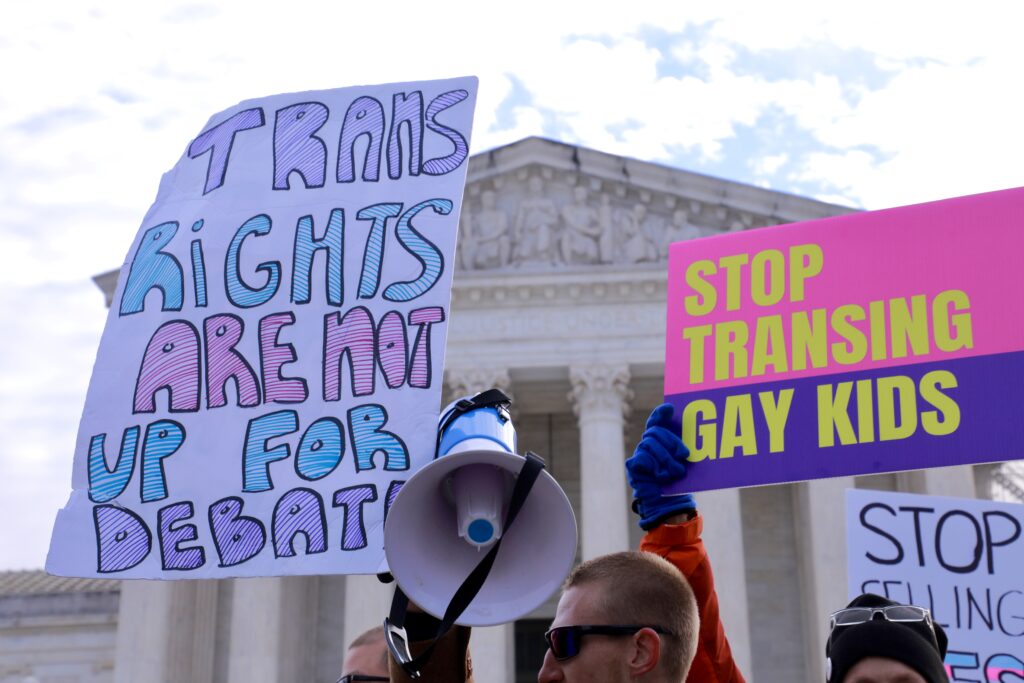
Effectively throwing cold water on longstanding hopes of LGBTQ advocacy organizations, there appeared to be little eagerness among the justices to extend reach of the court’s 2020 Supreme Court decision — written by Justice Gorsuch — that enshrined workplace-discrimination protections for gay and trans people under the Civil Rights Act.
In particular, attorneys for the Tennessee transgender youths — referred to as L.W., 16, a transgender girl, Ryan Roe, 15, a transgender boy, and John Doe, 12, another transgender boy — sought to convince the court that by forbidding these minors’ access to transition medications, the state violates the Equal Protection Clause of the 14th Amendment by unlawfully discriminating based on sex. And in what many legal scholars consider to be a Hail-Mary argument before such a conservative court, the petitioners further posited that transgender minors are a protected class under this crucial passage of the Constitution.
This pivotal case lands in the nation’s highest court at a precarious turning point for the transgender movement. Amid a recent surge in gender-identity exploration in young people, the foot soldiers of this civil-rights struggle stand within the crosshairs of an increasingly bitter and divisive culture war over trans people’s access to gender-transition treatment and single-sex spaces such as bathrooms, as well as inclusion in women’s sports.
During the final weeks of the presidential race, the Trump campaign and other Republicans spent some $215 million on an avalanche of ads attacking Vice President Harris for, most memorably, her stated support in a 2019 ACLU survey for taxpayer-funded gender transition surgeries for undocumented immigrants in detention. Now, as Democrats continue to debate the causes of their stinging losses, finger pointing and recriminations have left transgender people concerned the party will abandon their cause when they most need support.

Regardless, the Supreme Court’s ultimate decision in the Tennessee case, expected in June, will likely deal a demoralizing blow to the transgender rights movement in general and the nascent and besieged field of pediatric gender medicine in particular. Over the past few years, leaders in trans activism and advocacy, such as Glaad and the Human Rights Campaign, have placed defending access to gender-transition treatments for minors at the center of what has increasingly been a losing civil rights battle on multiple fronts.
What’s more, Justice Ketanji Brown Jackson expressed alarm on Wednesday that should the court not conclude that the Tennessee law amounted to sex-based discrimination, the decision could ultimately weaken long-standing protections against discrimination based on race and on sex in other contexts.
“I’m worried that we’re undermining the foundations of some of our bedrock equal-protection cases,” said Justice Jackson, one of the court’s three liberals.
U.S. v. Skrmetti
The lawsuit, U.S. v. Skrmetti, was initially filed in a federal district court in April 2023 by the ACLU and others on behalf of the three Tennessee minors as well as their parents and one doctor. The previous month, Governor Lee of Tennessee, who is a Republican, had signed a law, called SB1, banning minors from receiving puberty blockers, cross-sex hormones, and gender-transition surgeries to enable them “to identify with, or live as, a purported identity inconsistent with the minor’s sex.” The plaintiffs have received such medications and assert that they have been instrumental to their well-being.
“SB1 has taken away the only treatment that relieved years of suffering for each of the adolescent plaintiffs,” Chase Strangio, who is co-director of the ACLU’s LGBT & HIV Project, said in court.
Previously, the district court found for the plaintiffs and issued an injunction against parts of the Tennessee law. Yet this was overturned in a 2-to-1 ruling by the 6th Circuit Court of Appeals, which rejected arguments that the law violated due-process and equal-protection rights.
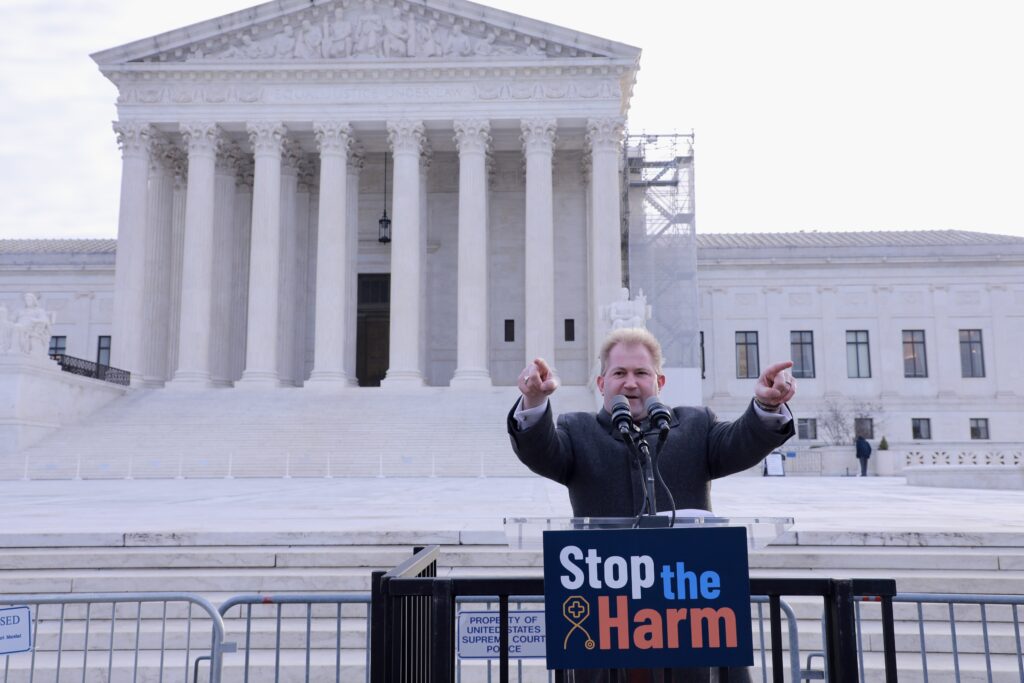
In its appeal to the Supreme Court, the ACLU sought a review based on both the due-process and equal-protection claims. Yet the high court only granted the Justice Department’s separate petition for review, which focused exclusively on the latter claim. Nevertheless, the court granted the ACLU’s request for the opportunity to present oral arguments.
Defending Tennessee’s attorney general, Jonathan Skrmetti, a Republican, before the court was the state’s solicitor general, Matthew Rice. Also named as defendants are the Tennessee Department of Health, the state’s board of medical examiners, and a number of state officials.
“Tennessee lawmakers enacted SB1 to protect minors from risky, unproven medical interventions,” Mr. Rice, who formerly clerked for Justice Clarence Thomas, said.
In a bright spot for the transgender movement, Mr. Strangio made history Wednesday as the first openly trans person to argue a case before the Supreme Court. Only he has recently said in rueful interviews that trans-rights litigants such as him are so demoralized that his primary ambition in pressing the case against the Tennessee law was to at least go down fighting on behalf of transgender children.
A sweeping set of state bans
The speed and breadth with which Republicans have moved to restrict the medical practice of what’s known as gender-affirming care has stunned trans advocates and thrown them on the back foot.
Defenders of the Tennessee ban — a group that submitted 51 amicus, or “friend-of-the-court,” briefs, to outdo the 32 such briefs submitted by opponents of the law — typically agree that these children are vulnerable. Yet the ban’s proponents argue that such young people are at serious risk of being harmed — not helped — by these powerful drugs that arrest their puberty and can irreversibly alter their secondary sex characteristics. They characterize the field of pediatric gender medicine as unscrupulous, one in which advocacy goals are so prioritized over rigorous science that state intervention is a moral imperative.
Between 2021 and 2023, 24 Republican-dominated state houses passed laws banning pediatric gender-transition treatment and surgeries. An additional two states, Arizona and New Hampshire, have just banned such surgeries. Seventeen of these state laws are under legal challenges in both state and federal courts. Most of the federal cases have reached the appellate level; all these cases make both equal-protection and due-process claims, which typically focus on parents’ rights to make medical decisions on behalf of their children.
The case before the Supreme Court only concerns Tennessee’s bans on the medications, including the hormones testosterone and estrogen, and puberty blockers, not the surgeries.
Many trans advocates have characterized conservatives’ efforts to usher in bans of pediatric gender-transition treatment, along with policies restricting trans children’s participation in sports and bathroom access, as a cynical power grab motivated by animus toward a tiny and vulnerable sliver of the population.
“Transgender youth are not political pawns—they are children who deserve compassion, medical care and the same opportunities to thrive as all youth,” HRC president Kelly Robinson said in a statement this week.
In a recent analysis of insurance-claims data, the nonprofit Do No Harm issued a conservative estimate that nationally, at least 14,000 minors had received gender-transition treatments, surgeries, or both between 2019 and 2023.
According to a similar analysis out of the Manhattan Institute, some 320,000 to 400,000 minors received a diagnosis of gender dysphoria — which is distress stemming from a disconnect between an individual’s sex and gender identity — or a similar condition between 2017 and 2023.
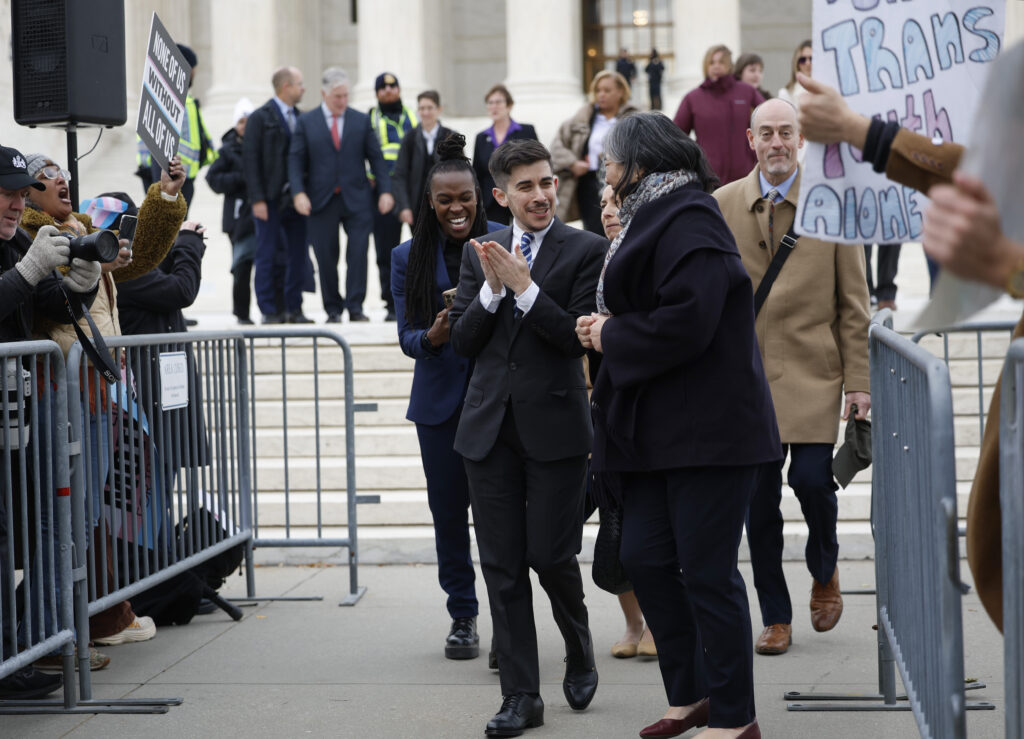
Multiple reports have documented soaring rates of gender dysphoria diagnoses and trans identification in adolescents and young adults in recent years. The Williams Institute at UCLA Law School reported in 2022 that 1.4 percent of 13 to 17 year olds, or 300,000, identified as trans according to surveys conducted between 2017 and 2020 — a near doubling of what the institute reported five years earlier. A recent Centers for Disease Control and Prevention report suggested that this figure might have doubled again by 2023.
In April, the influential activist-medical organization the World Professional Association for Transgender Health, or WPATH, went so far as to assert in a statement that the majority of youth who identify as transgender would be best served by a medical transition.
According to Duke Law School professor Doriane Lambelet Coleman, gender-transition treatments are arguably unprecedented within the cross-section of medical ethics and the law.
“As a general matter, before the development of pediatric gender-affirming care, American law didn’t formally countenance significant intervention into the body of a minor to treat their mind,” Ms. Coleman said in an interview.
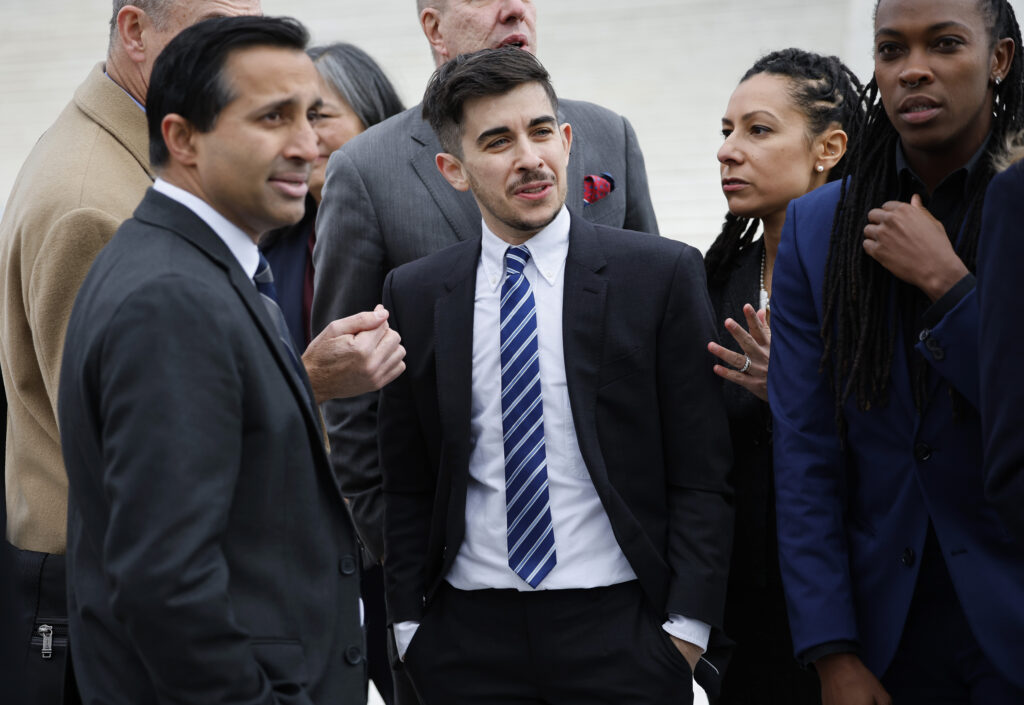
Philosophical and metaphysical questions about the validity and source of trans identity aside, gender dysphoria is, after all, a psychiatric diagnosis — one that WPATH’s widely referenced trans-care guidelines indicate is required to receive such interventions.
These treatments can also damage otherwise healthy bodily functions, posing the risk of infertility and sexual dysfunction, especially for natal males who start them in early puberty. However, Mr. Strangio reported to the justices on Wednesday that many transgender people who undergo cross-sex hormone treatment do later succeed in having biological children.
Ms. Coleman nevertheless told the Sun: “In most states, children don’t have the legal capacity to consent to general medical treatment and their parents don’t have the right to consent to overly risky treatment.”
Advocates of pediatric gender medicine assert that these treatments are safe and effective and provide a host of benefits, including reductions in depression, anxiety, and suicidality. The lion’s share of major American medical organizations explicitly back these treatments; many submitted amicus briefs opposing the Tennessee law.
However, the oft-repeated claim that these treatments are “life saving” was not supported by the only study ever to directly address this question, which was published in February.
When pressed by Justice Samuel Alito over whether such treatment prevents suicide death, Mr. Strangio acknowledged that “completed suicide is thankfully and admittedly rare.” Research out of England and Finland has indicated as much.
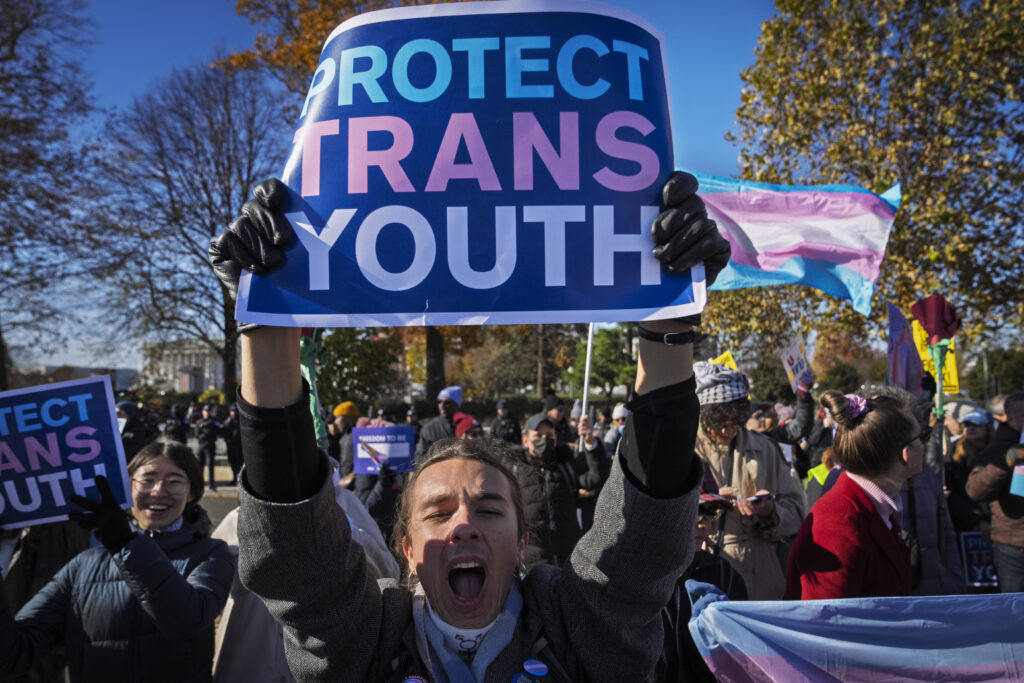
More broadly, more than a half-dozen systematic literature reviews —the gold standard of scientific evidence — published since 2020 have found that the evidence backing gender-transition treatment for minors is weak and inconclusive. Consequently, five European nations have sharply restricted minors’ access to such interventions and have reclassified them as experimental. “Supporters of the bans have been eager to address these turnabouts in their amicus briefs—as did Mr. Rice in his oral argument—while opponents have been keen to omit mention of or downplay them.”
Additionally, a trove of internal documentation subpoenaed by Alabama’s attorney general, Steve Marshall, for a separate federal lawsuit over that state’s pediatric gender-transition treatment ban showed that leading figures in this medical field are well aware of the deficiencies of the relevant scientific evidence.
Unsealed in June, subpoenaed emails between top Wpath members disclosed that they had deliberately papered over the evidence base’s shortcomings. Wpath leadership purposefully crafted certain passages in the organization’s trans-care guidelines to secure insurance coverage and arm the medical field against current and future litigation — such as by calling treatments “medically necessary,” despite a paucity of research backing this claim. There is even documentation suggesting that Wpath coordinated in partnership with the ACLU in these efforts to buttress their shared advocacy goals.
None of this damning evidence from the Alabama case entered the official record of the Tennessee suit. However, Mr. Marshall submitted a scathing amicus brief to the Supreme Court that chronicles the secretive inner workings of Wpath in unsparing detail. This includes documentation indicating that a Biden Administration health official, Admiral Rachel Levine, who is transgender, pressured Wpath to remove all age limits on pediatric gender-transition treatments and surgeries, explicitly for political reasons. Ultimately, the American Academy of Pediatrics was successful at the 11th hour in pressuring Wpath to heed to this demand when the organization published a revision to its trans-care guidelines in 2022.
“On the basis of sex”
Copious ink has been spilled in the amicus briefs on either side of this case over the validity, or lack thereof, of the research behind pediatric gender medicine. However, the case does not centrally hinge upon such science. Such questions lie more at the margins of the justices’ deliberations.
Most importantly, the Supreme Court is tasked with deciding whether, under the 14th Amendment, Tennessee’s law discriminates against the petitioners based on their sex. Per the court’s long-standing interpretation of the 14th Amendment, sex is what is considered a “quasi-suspect” class. Accordingly, laws that discriminate based on sex must clear a higher bar — known as “intermediate scrutiny” — to determine whether such discrimination passes legal muster — the highest bar, called “strict scrutiny,” is reserved for laws discriminating based on “suspect classes,” including race, religion, national origin or lack of citizenship. This means that those defending such laws must convince the judicial branch that the law is substantially tied to achieving an important state interest and that the bans are substantially related to the achievement of that goal.
It is at least theoretically possible that Tennessee could convince the Supreme Court — or, more likely, the 6th Circuit, should the justices send the case back there — that the scientific basis for these medical interventions is so weak that the ban still satisfies intermediate scrutiny, legal experts told the Sun.
If the court concludes that the Tennessee ban does not discriminate based on sex, this triggers what’s known as rational-basis review of the law — a relatively low bar to clear that shows more deference to legislatures.
Regardless, all Tennessee would then have to do is demonstrate that it was not being arbitrary and capricious in passing the law. Given that the Constitution grants states wide latitude to regulate medicine, and given what supporters of the Tennessee law argue are substantial disagreements by experts over the safety and efficacy of these medical interventions, this would likely be an easy bar for any state with such a ban to clear, according to legal experts.
“The government doesn’t have to wait for 100 percent proof that something is harmful. I think it’s enough for the government to say that we just don’t know the cost and the benefits” of pediatric gender-transition treatment, a professor of constitutional law at the South Texas College of Law, Houston, Josh Blackman, told the Sun.
During Wednesday’s oral arguments, the Justice Department and ACLU attorneys stressed that minors who are not transgender may receive puberty blockers for precocious puberty and hormones for conditions such as various endocrine disorders — treatments meant to help align their body with their natal sex. Consequently, they argued, banning these drugs for trans youth, in which their purpose is to align these minors’ bodies with their cross-sex gender identity, is sex-based discrimination.
The Tennessee law explicitly states that it seeks to encourage “minors to appreciate” their biological sex, which these attorneys argued betrayed clear discrimination on the basis of sex.
Mr. Strangio and the Justice Department’s Solicitor General, Elizabeth B. Prelogar, did not put as much emphasis as legal experts had expected on convincing the court to follow similar reasoning to their 2020 Bostock v. Clayton County ruling. In that 6-3 decision, in which the two conservative justices were joined by the court’s then-four-member liberal bloc, Justice Gorsuch surprised court watchers when he wrote for the majority that the protections against sex-based employment discrimination within Title VII of the 1964 Civil Rights Act applied to transgender people. He wrote that “it is impossible to discriminate against a person for being homosexual or transgender without discriminating against that individual based on sex.”
And while neither Mr. Strangio nor Ms. Prelogar placed the matter front and center in their arguments, both argued in Wednesday’s oral argument that transgender people are themselves a quasi-suspect class, warranting intermediate scrutiny of the law. This argument was expected to provoke resistance from the conservative justices, who did not disappoint. Since the 14th Amendment was ratified during Reconstruction in 1868, the court has demonstrated steadfast reluctance toward expanding the roster of protected classes. The court has in recent history passed on recognizing, for example, gay people as a class, even as they legalized same-sex marriage.
Justice Alito quizzed Mr. Strangio on why the court should recognize transgender status as a protected class when it has not done the same for people with schizophrenia.
The conservative justice further pressed the ACLU attorney on whether being trans is an immutable characteristic, which would help weigh in transgender status’ favor for qualifying as a quasi-suspect class. The justice asked him about people who switch back and forth between identifying as male and female or who are otherwise what’s known as gender fluid.
In response, Mr. Strangio emphasized a definition of transgender as having a gender identity different from one’s sex and pointed to scientific research suggesting being transgender has a biological basis.
Mr. Rice, by contrast, argued that the Tennessee ban does not discriminate on the basis of sex because it treats both natal boys and natal girls the same; it forbids gender-transition treatments regardless of sex.
Nor does the law discriminate based on identity, Mr. Rice argued. Rather, it concerns treatment for a medical condition, or what in the words of the Tennessee law is “purported discomfort or distress from a discordance between the minor’s sex and asserted identity.” He argued that Mr. Strangio and Ms. Prelogar were conflating the differences based on sex and medical conditions between children who could versus could not access these treatments. And among people seeking these drugs for a gender-transition, he said, the law discriminates based on age, not sex, by applying an age-of-majority cut-off.
Age is not a protected class under the 14th Amendment.
Mr. Strangio expressed concern that Tennessee wouldn’t necessarily stop at banning gender-transition treatment for minors. “Tennessee’s arguments that SB1 is sex-neutral would apply if the state banned this care for adults too,” he said.
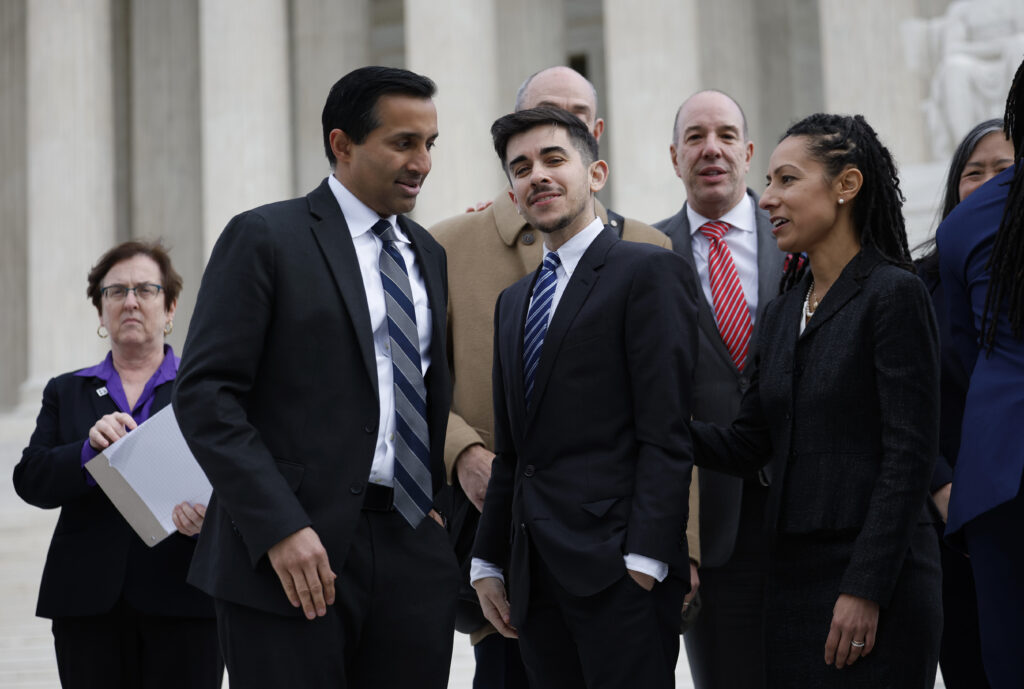
However, the associate counsel at the Center for American Liberty, Eric Sell, said, “I also think Roberts, Kavanaugh, and Barrett will also probably leave the door opening to trans-identifying adults to bring a substantive due-process or invidious discrimination claim if states start banning these same procedures for adults.”
Chief Justice Roberts and Justice Brett Kavanaugh, who is a conservative, expressed support for Mr. Rice’s argument that legislatures, not the courts, are the proper forum for settling disputes over medical practices.
Justice Jackson, by contrast, said: “I guess I’m still seeing a role for the Constitution in circumstances in which the claim that is being made is that the state’s choices are implicating the equal protection rights of its citizens.”
A professor at Rutgers Law School, Katie Eyer, referencing justices suggesting that the Tennessee law did not warrant intermediate scrutiny, said in an email: “This sort of reasoning would suggest that any new politically vulnerable group would never be able to secure ‘closer look’ review from the courts, even where they are extremely politically vulnerable, and being subjected to political attacks.”
Both Ms. Prelogar, who formerly clerked for Justice Elena Kagan, and Mr. Strangio expressed receptiveness to state laws modeled after the one in West Virginia that regulates pediatric gender-transition treatment but does not ban it. They were keen to point out that none of the European nations that have recently restricted pediatric access to gender-transition treatment have issued an outright ban akin to Tennessee’s law.
Should the Supreme Court find that Tennessee’s ban on gender-transition treatment does not violate the Equal Protection Clause, bans in other states will then likely be considered constitutional as well. However, legal challenges on other grounds, such as a due process claim, might still persist.
On the flip side, if the high court rules that the state ban on gender-transition interventions discriminates on the basis of sex, states would then likely have to seek to defend their bans in federal courts based on intermediate scrutiny. It remains possible they could still succeed.
A wild card is the prospect that Trump’s Justice Department could withdraw the petition in the Tennessee case. This might send the case back to lower courts, only to see this issue return to the Supreme Court in a subsequent term. Or the court might just switch to accepting the ACLU’s equal-protection complaint and otherwise not change course.
All these swirling legal theories notwithstanding, the question of the science still has relevance, said Mr. Sell.
“While the efficacy of gender-affirming care is not technically before the court, I think it will be at the forefront of the justices’ minds as they decide this case,” he said.

